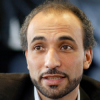Tariq Ramadan

Tariq Ramadan
Tariq Ramadanis a Swiss academic, philosopher and writer. He is the professor of Contemporary Islamic Studies in the Faculty of Oriental Studies at St Antony's College, Oxford and also teaches at the Oxford Faculty of Theology. He is a visiting professor at the Faculty of Islamic Studies, the Université Mundiapolisand several other universities around world. He is also a senior research fellow at Doshisha University. He is the director of the Research Centre of Islamic Legislation and Ethics, based in...
NationalitySwiss
ProfessionWriter
Date of Birth26 August 1962
CountrySwitzerland
You can be a very charitable capitalist. Like [Nicola] Sarkozy was saying, we have to 'moralise capitalism', which for me is a contradiction in terms.
Those young ones who want to try military jihad are facing a triple issue. First of all, they are missing the point when it comes to understanding what there is at stake from a political viewpoint. How come so many of them are going to Syria and so few to Palestine, even though, when it comes to symbolism, Palestine definitively wins.Then, it is essential to understand that it is not a religious matter. Finally, let's not forget about the recruiters behind their screens. Those ones are quite skillful and well-supported financially.
Things need to be properly named. Political confusion starts with terminology confusion. Islamism implies some sort of political and social plan for Muslim people. In that classification, we find different categories.
I am saying the same to Muslims in the global South, telling them: "Just ignore what is done." However, in the Southern countries they are not living in a comfortable society like you and me. They deal with unemployment, corruption, and surviving. For the majority of them, their religion is helping them survive.
When I am talking to people from Germany, we should know that there are certain things and certain histories that are very important for people. If you look at all the Muslims living in the West, they didn't react in a violent way. They don't like what they saw but they are citizens like you and me and they look at it and say: "This is a silly video but we are not going to react."
51% of the French people - who are not very religious - were thinking that what "Charlie Hebdo" did was unwise. They aren't asking for a law to prevent Charlie Hebdo from publishing caricatures, but they are calling on its editors to be a bit more sensible.
Drafting of the constitutions is interesting and the discussions around them revealing in many ways. I take it as a discussion of very important symbols revealing many different problems. My take at the beginning was to warn that Tunisia might be the only successful country, the only one to justify us in talking about the spring, while all the other countries were less successful, if not failing. Now the point is that even in Tunisia it is not going to be easy, and this is where we have a problem.
Muslim societies must leave behind these dual aspects: secularism/Islamism.
There is great potential and deep fragility [in Malaysia] that can be used by any group that stresses on religion, pushing towards Islam, rejecting people and alienating migrants - anything can be used to win the next elections. So these are the signs of fragility that is very much there.
Having traveled a lot and met people from different horizons it makes you more humble and ready to listen.
I'm working on different fields. One of my next books Insha'Allah will be a novel because it's important to explore the heart and imagination, the spiritual side. I've been working for twenty five years in the legal field and now I'm reaching what I want, which is an Islamic applied ethics and I'm also dealing with Muslims in the West.
To Islamize doesn't make sense to me. But to center, but to have intellectual empathy and modesty - all these dimensions are important on how we look at truth.
We always think from where we come from. We always think from the sources that shape our understanding. I think about the world through the lens of my Islamic tradition. I accept this but I must also have intellectual humility.
We must re-center philosophy within our frame of reference which I think is the way to deal with it.